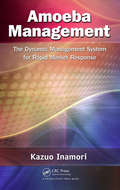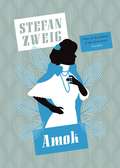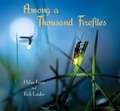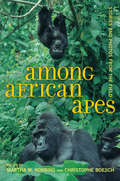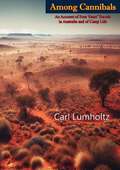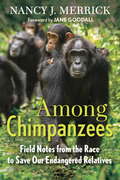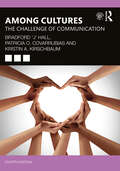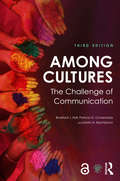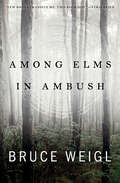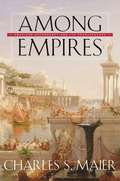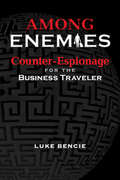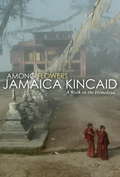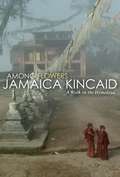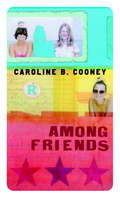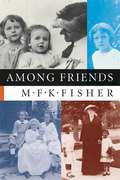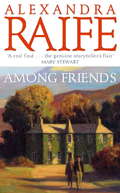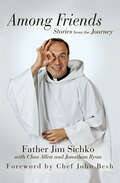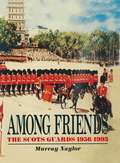- Table View
- List View
Amoeba Management: The Dynamic Management System for Rapid Market Response
by Kazuo InamoriEspecially effective in dynamic and highly competitive environments, the Amoeba Management System has received attention from the Harvard Business Review and has already been successfully adopted at more than 400 companies around the world. At the heart of this innovative management system is a business philosophy based on doing the right thing as
Amok (Classics To Go)
by Anthea Bell Stefan ZweigA new pocket edition of this Conradian tale of maddening desire, from the master of the novellaOn a sweltering ocean-liner travelling from India to Europe a passenger tells his story: the tale of a doctor in the Dutch East Indies torn between his duty and the pull of his emotions; a tale of power and desire, pride and shame and a headlong flight into folly.This is one the most intense and incisive of the novellas which brought Stefan Zweig to worldwide fame.
Amok at Schools: Prevention, Intervention and Aftercare in School Shootings
by Matthias BöhmerSchool shootings - colloquially referred to as school rampages - represent a rare but serious form of targeted violence in schools. This book first presents the causes discussed in current scientific research. In addition to perpetrator characteristics, emphasis is placed on the private and school environment, the influence of mass media, accessibility to weapons, and the consumption of violent media. Secondly, primary and secondary preventive measures are presented, such as profiling, threat assessments and the phenomenon of leaking. And thirdly, the focus is on aftercare in school shootings, the aim of which is to cope with experienced psychotraumatic stress. Emergency psychological acute aids, short-term to medium-term, trauma-focused, as well as longer-term intervention measures for children, adolescents and adults are explained in more detail. Practical excursions on prevention as well as aftercare complement the corresponding chapters.
Amon's Secret: A Family Story of the First Christians
by Arnold YtreeideBest-selling author of family-tailored Lent and Advent books is back with a new adventureAdding to his widely popular Advent and Lent series, well-known author Arnold Ytreeide revisits the Jerusalem of Jesus in this captivating follow-up to Amon's Adventure. This time, Ytreeide takes families into the life of one of the founders of the church.Thirteen-year-old Amon has just watched Jesus ascend into heaven. What will Christ's followers do now? In the midst of Amon's confusion, the apostle Peter hands him an assignment: invent a way for the new Christian church to communicate and meet in secret. It must not be noticed by the penetrating eyes of Jesus' enemies who are still looking for anyone who dared call him the Messiah.Amon's task quickly turns dangerous. The Sanhedrin, led by Saul, begins hunting down believers in "The Way," even stoning some to death. Now Amon must walk a treacherous line between finishing the job he was given and working safely around those who would kill him if they knew his secret. Can he dodge cranky Romans and angry Pharisees and find a way for the new church to survive?With short, action-filled chapters, reflections for family devotions, and a foundation of archaeological evidence, Amon's Secret is a fun and powerful way to connect to the church's beginnings.
Among A Thousand Fireflies
by Helen Frost Rick Lieder<P>On a summer evening, just as the stars blink on, a firefly lands on a flower. Lights start to flash all around her -- first one, then three, seven. Hundreds. Thousands. How will she find just one flash among them? And will he see her flash in return? <P>In evocative photographs and lyrical language, Rick Lieder and Helen Frost, creators of the critically acclaimed Step Gently Out and Sweep Up the Sun, offer a true story of how two fireflies come together after finding each other's light among thousands of others.
Among African Apes
by Martha M. Robbins Christophe BoeschThese compelling stories and photographs take us to places like Bwindi Impenetrable National Park in Uganda, Ivindo National Park in Gabon, and the Taï National Park in Côte d'Ivoire for an intimate and revealing look at the lives of African wild apes--and at the lives of the humans who study them. In tales of adventure, research, and conservation, veteran field researchers and conservationists describe exciting discoveries made over the past few decades about chimpanzees, bonobos, and gorillas. The book features vivid descriptions of interactions among these highly intelligent creatures as they hunt, socialize, and play. More difficult themes emerge as well, including the threats apes face from poaching, disease, and deforestation. In stories that are often moving and highly personal, this book takes measure of how special the great apes are and discusses positive conservation efforts, including ecotourism, that can help bring these magnificent animals back from the brink of extinction.
Among Angels
by Jane Yolen Nancy WillardA magical, whimsical, and heart-soaring collection of angelic poetry from two award-winning literary masters Acclaimed novelist Nancy Willard and World Fantasy Award and Nebula Award-winning author and editor Jane Yolen collaborate on this magnificent anthology of their original poetry. For years the 2 friends and literary colleagues have shared a mutual fascination with God's winged messengers and exchanged angel poems--some reverent, some witty, some sweet, some biting, and each one a miraculous invention. Now these wondrous flights of angelic fancy are gathered together in a singular collection of breathtaking verse. Rooted in the Christian and Hebrew traditions, these brief, lyrical masterworks celebrate the heavenly beings that have flown through our collective imagination for centuries: Gabriel and the archangel Michael, the fallen Lucifer and the Angel of Death. In rich and sumptuous poetry, the authors muse on angels' flight, feathers, faith, writing on pinheads, and the glory and inconvenience of having wings. To luxuriate in Yolen and Willard's poetic words, ideas, and unforgettable images is to truly fly among angels.
Among Cannibals: An Account Of Four Years' Travels In Australia And Of Camp Life With The Aborigines Of Queensland
by Carl LumholtzCarl Lumholtz’s "Among Cannibals: An Account of Four Years' Travels in Australia and of Camp Life" is a riveting and detailed chronicle of the author’s extraordinary explorations in the remote regions of Australia during the late 19th century. This classic work offers a captivating insight into the diverse landscapes, cultures, and experiences encountered by Lumholtz during his extensive travels.Lumholtz, a renowned Norwegian explorer and ethnographer, embarked on his journey with the goal of studying the indigenous peoples of Australia, particularly those living in the most isolated and unexplored areas. His narrative vividly describes the challenges and triumphs of living in the Australian wilderness, from the dense rainforests of Queensland to the arid outback.Central to "Among Cannibals" is Lumholtz’s deep engagement with the Aboriginal communities he encounters. His empathetic and respectful approach to understanding their way of life, customs, and beliefs provides readers with a nuanced and humanizing portrayal of these cultures.Lumholtz’s narrative is not only a valuable ethnographic record but also an adventurous travelogue that captures the reader’s imagination. His encounters with wildlife, the natural beauty of the Australian landscape, and the everyday challenges of camp life are described with vivid detail and a keen sense of wonder."Among Cannibals" is a seminal work in the fields of anthropology and exploration, offering timeless insights into the lives of Australia’s indigenous peoples and the spirit of adventure that drove explorers like Lumholtz. This book remains an essential read for anyone interested in anthropology, Australian history, and the enduring allure of exploration.
Among Chimpanzees
by Jane Goodall Nancy J. MerrickA former student and colleague of Jane Goodall shares stories of chimps and their heroes, and takes readers on a journey to save man's closest relative. Unbeknownst to much of the public, chimps are in trouble: censuses show them to be extinct in four African countries and nearly so in ten others. A large percentage of the remaining populations live in unprotected, increasingly fragmented forests. When Nancy Merrick learned these startling facts in 2009, she decided it was past time to discover the extent to which chimpanzees are at risk across Africa and what can be done. Merrick had begun working with primates in 1972 as a young field assistant in Jane Goodall's famous Gombe camp. Like the rest of the world at the time, she was swept up in the excitement of discovering the remarkable world of chimpanzees--their ability to fashion tools, their dazzling intelligence, and their complex relationships and societies. From that moment on, her human-centered worldview shifted, and she became a devoted advocate for our closest genetic relatives. When Merrick returns to Africa decades later, she's alarmed by how much has changed. Human activity, such as agriculture and logging, has encroached on natural habitats throughout equatorial Africa, endangering chimpanzees, gorillas, and bonobos. In an effort to understand what we can do to save great apes, Merrick connects with primatologists and conservationists who are trying to protect the last great forests. Visits to some of Africa's parks, sanctuaries, and expanding agricultural areas reveal the urgency of the problems and the inspiration of the people leading the search for solutions. Along the way, Merrick demonstrates that the best hope for chimps and other great apes lies in connecting conservation to humanitarian efforts, ensuring a healthy future for animals and humans alike. Among Chimpanzees is at once an inspiring chronicle of Merrick's personal search to learn how chimps are faring across Africa and in captivity, a crucial eyewitness account of a very critical period in their existence, and a rousing call for us to join the efforts to be a voice for the chimpanzees, before it's too late.From the Hardcover edition.
Among Cultures: The Challenge of Communication
by Kristin A. Kirschbaum Patricia O. Covarrubias Bradford 'J' HallThrough its unique approach of using narratives and stories to convey theories and concepts, this text, now in its fourth edition, gives students a foundational knowledge in intercultural communication that is imperative for understanding and navigating our increasingly complex human interactions. This edition continues with an interpretive approach to intercultural communication that is dedicated to providing resources to understand and explain how our own and other cultural systems are reasonable and valuable. New to this edition are increased explorations of immigration, intersectionality, and privilege. For greater flexibility, it introduces a series of mini chapters on topics such as globalization (including discussion of the impact of new media and popular culture), education, and the role of culture in family communication, health communication, environmental communication and multicultural leadership. Each chapter again closes with a summary, reflection questions, and suggestions for activities available for students’ own review or as potential class exercises. The book is an ideal companion for introductory or upper-level undergraduate courses in intercultural communication. Online resources include self-tests, enrichment activities, reflection questions, recommendations for addition readings for students, lecture slides, chapter objectives, supplemental readings, sample discussion and test questions, and additional classroom activities for instructors. Please visit www.routledge.com/cw/hall.
Among Cultures: The Challenge of Communication
by Bradford J. Hall Kristin A. Kirschbaum Patricia O. CovarrubiasAmong Cultures: The Challenge of Communication, Third Edition explores intercultural communication and the relationship between communication and culture, using narrative as a common and compelling thread for studying intercultural interactions. Anchored in the position that people make sense of their worlds through choosing and telling narratives to themselves and others, this text is replete with narratives and stories. Chapters address key aspects of intercultural communication, including verbal and nonverbal communication; stereotypes and bias; identity; conflict; diversity; and ethics. Using an interpretive approach to intercultural communication, the text helps students understand that although a person may appear different, his/her common sense is quite reasonable within a particular interpretive context. Resources are included to help students understand and explain the reasonableness of other cultural systems. The text includes activities for students to complete while reading, including self-assessments and nonverbal self-knowledge tests. Reflection questions within and at the end of each chapter promote thinking and discussion on each topic. With its unique approach to studying intercultural communication via real-life narratives, this text facilitates a deep understanding of the cultural aspects of communication. In providing the narratives of others, it encourages students to tell their own stories and build a strong foundation for communicating across cultures. New to the Third Edition: New chapter—"What Role Does Culture Play in Contemporary Contexts?"—explores intercultural communication as it relates to the environment, health, and technology. New sections on identity, silence, and terms of address as important communicative practices in intercultural settings. Updated sections on honorifics, key terms, social dramas and the golden approaches to ethics.
Among Elms, in Ambush
by Bruce WeiglThis powerful new work by Bruce Weigl follows the celebrated poet and Vietnam War veteran as he explores combat, survival, and PTSD in brief prose vignettes. In compact, transcendent, and poetic prose, Bruce Weigl chronicles somber observations on the present day alongside painful memories of the war. Reflections on school shootings and the lightning-fast spread of news in the 21st century are set alongside elegies for forgotten soldiers and the lifelong struggle of waiting for the trauma of war to fade. Haunting and nuanced, Among Elms, in Ambush carries readers through meditations and medications, past the shapes of figures in the dark rice fields of Viet Nam and the milkweed pods in the frost-covered fields of Ohio, toward a hard-won determination to survive.
Among Empires: American Ascendancy and Its Predecessors
by Charles S. MaierContemporary America, with its unparalleled armaments and ambition, seems to many commentators a new empire. Others angrily reject the designation. What stakes would being an empire have for our identity at home and our role abroad? A preeminent American historian addresses these issues in light of the history of empires since antiquity. This elegantly written book examines the structure and impact of these mega-states and asks whether the United States shares their traits and behavior. Eschewing the standard focus on current U.S. foreign policy and the recent spate of pro- and anti-empire polemics, Charles S. Maier uses comparative history to test the relevance of a concept often invoked but not always understood. Marshaling a remarkable array of evidence--from Roman, Ottoman, Moghul, Spanish, Russian, Chinese, and British experience--Maier outlines the essentials of empire throughout history. He then explores the exercise of U.S. power in the nineteenth and twentieth centuries, carefully analyzing its economic and strategic sources and the nation's relationship to predecessors and rivals. To inquire about empire is to ask what the United States has become as a result of its wealth, inventiveness, and ambitions. It is to confront lofty national aspirations with the realities of the violence that often attends imperial politics and thus to question both the costs and the opportunities of the current U.S. global ascendancy. With learning, dispassion, and clarity, Among Empires offers bold comparisons and an original account of American power. It confirms that the issue of empire must be a concern of every citizen.
Among Enemies: Counter-Espionage for the Business Traveler
by Luke Bencie William J. EspositoEach business day, some 35,000 executives, scientists, consultants, and lawyers pass through the nation's airports to destinations across the globe. They carry, along with proprietary documents and computer files, the latest in personal electronic gear. However, carefully watching most of those travelers--beginning the moment they arrive at the airport and often sooner--are uncounted numbers of espionage operatives. These individuals work for foreign intelligence services and economic concerns and seek to separate international business travelers from their trade secrets. To succeed, they use many time-tested techniques to lure unsuspecting travelers into vulnerable or compromising positions. They also employ the latest electronic means to steal business information often at a distance from their prey. This is the 21st century, after all, and economic and industrial espionage have become multibillion-dollar enterprises, utilizing a wide array of the most sophisticated means to obtain proprietary information. Luke Bencie is a veteran of this struggle. He knows intimately the threats business travelers face and how to combat those threats. In Among Enemies: Counter-Espionage for the Business Traveler, Bencie provides everything you need to know to protect yourself and your company from attempted espionage.
Among Flowers
by Jamaica KincaidIn this delightful hybrid of a book-part memoir and part travel journal-the bestselling author takes us deep into the mountains of Nepal with a trio of botanist friends in search of native Himalayan plants that will grow in her Vermont garden. Alighting from a plane in the dramatic Annapurna Valley, the ominous signs of Nepal's Maoist guerrillas are all around-an alarming presence that accompanies the travelers throughout their trek. Undaunted, the group sets off into the mountains with Sherpas and bearers, entering an exotic world of spectacular landscapes, vertiginous slopes, isolated villages, herds of yaks, and giant rhododendron, thirty feet tall. The landscape and flora and so much else of what Kincaid finds in the Himalaya-including fruit bats, colorful Buddhist prayer flags, and the hated leeches that plague much of the trip-are new to her, and she approaches it all with an acute sense of wonder and a deft eye for detail. In beautiful, introspective prose, Kincaid intertwines the harrowing Maoist encounters with exciting botanical discoveries, fascinating daily details, and lyrical musings on gardens, nature, home, and family.
Among Flowers: A Walk in the Himalaya
by Jamaica KincaidAnyone familiar with Jamaica Kincaid's work knows that the natural world and in particular, plants and gardening are especially close to her heart. In this vivid account she invites us to accompany her on a seed-gathering trek in the Himalaya. For Kincaid and three botanist friends, Nepal is a paradise a place where a single day's hike can traverse climate zones from sub-tropical to alpine encompassing flora suitable for growing in their home grounds from Wales to Vermont. A wonderful blend of introspective insight and beautifully rendered description, Among Flowers is a seriously entertaining thoroughly engaging and characteristically frank memoir from one of the most distinctive and striking voices writing today.
Among Flowers: A Walk in the Himalaya
by Jamaica KincaidIn this delightful hybrid of a book - part memoir and part travel journal - the bestselling author takes us deep into the mountains of Nepal with a trio of botanist friends in search of native Himalayan plants that will grow in her Vermont garden. Alighting from a plane in the dramatic Annapurna Valley, the ominous signs of Nepal's Maoist guerrillas are all around - an alarming presence that accompanies the travelers throughout their trek. Undaunted, the group sets off into the mountains with Sherpas and bearers, entering an exotic world of spectacular landscapes, vertiginous slopes, isolated villages, herds of yaks, and giant rhododendron, thirty feet tall. The landscape and flora and so much else of what Kincaid finds in the Himalaya - including fruit bats, colourful Buddhist prayer flags, and the hated leeches that plague much of the trip - are new to her, and she approaches it all with an acute sense of wonder and a deft eye for detail. In beautiful, introspective prose, Kincaid intertwines the harrowing Maoist encounters with exciting botanical discoveries, fascinating daily details, and lyrical musings on gardens, nature, home, and family.
Among Flowers: A Walk in the Himalaya (National Geographic Directions Ser.)
by Jamaica KincaidIn this travel memoir, the acclaimed novelist Jamaica Kincaid chronicles a three-week trek through Nepal, the spectacular and exotic Himalayan land, where she and her companions are gathering seeds for planting at home. The natural world and, in particular, plants and gardening are central to Kincaid’s work; in addition to such novels as Annie John and Lucy, Kincaid is the author of My Garden (Book): a collection of essays about her love of cultivating plants and gardens throughout her life. Among Flowers intertwines meditations on nature and stunning descriptions of the Himalayan landscape with observations on the ironies, difficulties, and dangers of this magnificent journey.For Kincaid and three botanist friends, Nepal is a paradise, a place where a single day’s hike can traverse climate zones, from subtropical to alpine, encompassing flora suitable for growing at their homes, from Wales to Vermont. Yet as she makes clear, there is far more to this foreign world than rhododendrons that grow thirty feet high. Danger, too, is a constant companion—and the leeches are the least of the worries. Unpredictable Maoist guerillas live in these perilous mountains, and when they do appear—as they do more than once—their enigmatic presence lingers long after they have melted back into the landscape. And Kincaid, who writes of the looming, lasting effects of colonialism in her works, necessarily explores the irony of her status as memsahib with Sherpas and bearers.A wonderful blend of introspective insight and beautifully rendered description, Among Flowers is a vivid, engrossing, and characteristically frank memoir from one of our most striking voices.
Among Friends
by Caroline B. CooneyIn this fast-paced novel about the bonds of friendship, Jenny, Emily, and Hillary, known as the Awesome Threesome, thought they'd be a threesome forever. But with Jennie's relentless ambition, Emily's jealousy, and Hillary's building resentment, it seems the Awesome Threesome is destined to be a thing of the past. Assigned to write in diaries for English class, the three girls, along with three other classmates, find themselves admitting things so terrible that even they are shocked. All are left wondering: What price does a person have to pay for being successful? The pursuit of the truth is compellingly chronicled and the resolution satisfies.
Among Friends
by M. F. K. Fisher"Among Friends," is M.F.K. Fisher's fascinating memoir of her childhood in Whittier, California. In sharing these memorable and moving portraits of her family and of the town, we are given an enchanting glimpse into the early life of one of our most delightful and best-loved writers.
Among Friends: A Novel
by Hal EbbottWhat begins as celebration gives way to betrayal, shattering the trust between two families&“Exquisitely crafted.&” —John Irving &“Masterly…Ranges from the most exquisite, Jamesian discriminations to the graspable, all-American solidities of Updike and Richard Yates. This is a writer to watch, with excitement and the highest expectations.' —John Banville&“Wonderful, sly and subtle…Every sentence keeps you hanging in the air, waiting for the next punch to the gut. Wow.&”—Miranda Cowley Heller "In the way that a forceful intelligence or an infectious voice or a fresh vision can alter how we observe and answer the world, Among Friends brought me into its cool environs and made me engage my days differently. It's no small accomplishment for a first novel, or for any novel." —Richard FordIt&’s an autumn weekend at a comfortable New York country house where two deeply intertwined families have gathered to mark the host&’s fifty-second birthday.Together, the group forms an enviable portrait of middle age. The wives and husbands have been friends for over thirty years, their teenage daughters have grown up together, and the dinners, games, and rituals forming their days all reflect the rich bonds between them.This weekend, however, something is different. An unforeseen curdling of envy and resentment will erupt in an unspeakable act, the aftermath of which exposes treacherous fault lines upon which they have long dwelt.Written with hypnotic elegance and molten precision, and announcing the arrival of a major literary talent, Hal Ebbott&’s Among Friends examines betrayal within the sanctuary of a defining relationship, as well as themes of class, marriage, friendship, power, and the things we tell ourselves to preserve our finely made worlds.
Among Friends: A sweeping tale that will take you from the depths of grief to the heights of happiness (Perthshire Cycle, Book 5)
by Alexandra RaifeWill she get through the hardest of times with the support of her friends?In the two years since the loss of her husband and twin daughters in a fatal car crash, Louise has avoided facing up to the full extent of her bereavement by caring for her husband's elderly great-aunt. But now Aunt Bea, too, is dead and Louise is robbed of both a dear friend and a home. Caring is what Louise does best, and - with the proviso that she will not work in households with children - she joins an agency that specialises in supplying temporary domestic help. The demands made upon her, and the homes in which she finds herself, are varied and occasionally bizarre, but in confronting them she makes friends and discovers self-confidence.But then circumstances beyond her control land her in the situation she dreads most . . .**************Readers are loving AMONG FRIENDS!'A fascinating and worthwhile read' - 5 STARS'Another book from Alexandra Raife that I didn't want to put down' - 5 STARS'A wonderful read' - 5 STARS
Among Friends: A sweeping tale that will take you from the depths of grief to the heights of happiness (Perthshire Cycle, Book 5)
by Alexandra RaifeWill she get through the hardest of times with the support of her friends?In the two years since the loss of her husband and twin daughters in a fatal car crash, Louise has avoided facing up to the full extent of her bereavement by caring for her husband's elderly great-aunt. But now Aunt Bea, too, is dead and Louise is robbed of both a dear friend and a home. Caring is what Louise does best, and - with the proviso that she will not work in households with children - she joins an agency that specialises in supplying temporary domestic help. The demands made upon her, and the homes in which she finds herself, are varied and occasionally bizarre, but in confronting them she makes friends and discovers self-confidence.But then circumstances beyond her control land her in the situation she dreads most . . .**************Readers are loving AMONG FRIENDS!'A fascinating and worthwhile read' - 5 STARS'Another book from Alexandra Raife that I didn't want to put down' - 5 STARS'A wonderful read' - 5 STARS
Among Friends: Stories from the Journey
by Jonathan Ryan Chas Allen Father Jim SichkoA priest&’s inspiring story of bringing people together and bringing them closer to God—with some help from Dolly Parton, Martin Short, and others. This book is my Midrash. With these words, Father Jim Sichko draws us into a life story full of laughter, tears, and service, filled with insightful lessons gained during his many travels as a clergyman and motivational speaker. Whether recounting his sobering flying experiences, the time he met the pope, or his encounter with the &“Weed Man,&” Father Jim instructs through powerful storytelling. As he takes us along on his journey, from getting kicked out of seminary to hosting celebrities—including Dolly Parton, Harry Connick Jr., Martin Short, and former first lady Laura Bush—at his small Kentucky parish, Father Jim shines a light into the corners of the human heart to expose our need for God and the love He alone can give. With humor and striking honesty, Father Jim reveals what it means to worship God, have compassion for others, and live life among friends.
Among Friends: The Scots Guards, 1956–1993
by Murray NaylorThis book provides a complete insight into the history of the Scots guards from 1956-1993.
